Keanu Reeves all charm in Good Fortune, Aziz Ansari’s comeback after sticky scandal and failed movie
Keanu Reeves is all charm and delight in Good Fortune, a comeback movie for comedian, actor and filmmaker Aziz Ansari.
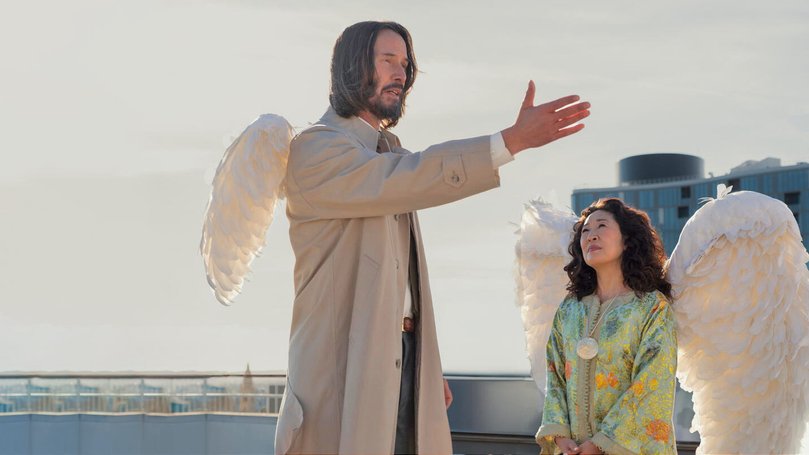
Good Fortune is full of great dialogue and visual gags.
One features Keanu Reeves standing opposite Sandra Oh, both framed in profile against the grey Los Angeles sky. They’re angels except her wings are enormous, looming large in the shot while his are tiny baby ones.
The moment works because Reeves is not only a tall man who otherwise towers over Oh, but because he’s Keanu bloody Reeves, cinema’s great action hero who slices through throngs of killers in John Wick, barely blinking an eye.
Sign up to The Nightly's newsletters.
Get the first look at the digital newspaper, curated daily stories and breaking headlines delivered to your inbox.
By continuing you agree to our Terms and Privacy Policy.But in Good Fortune, he’s an angel of low stature, whose only job is to save people from getting into car accidents while texting.
Good Fortune knows how to make excellent use of Reeves as Gabriel, a well-meaning guardian spirit who is moved by the unfortunate circumstances of one of his charges, Arj, a gig worker who is sleeping in his car and spends his day picking up odd jobs such as lining up for two hours for someone else’s fancy pastry.
Gabriel wants to convince Arj (Aziz Ansari) that his life has value even if he is dirt poor, and that having as much money as Jeff (Seth Rogen), a rich tech investor who just fired him, wouldn’t solve his problems.
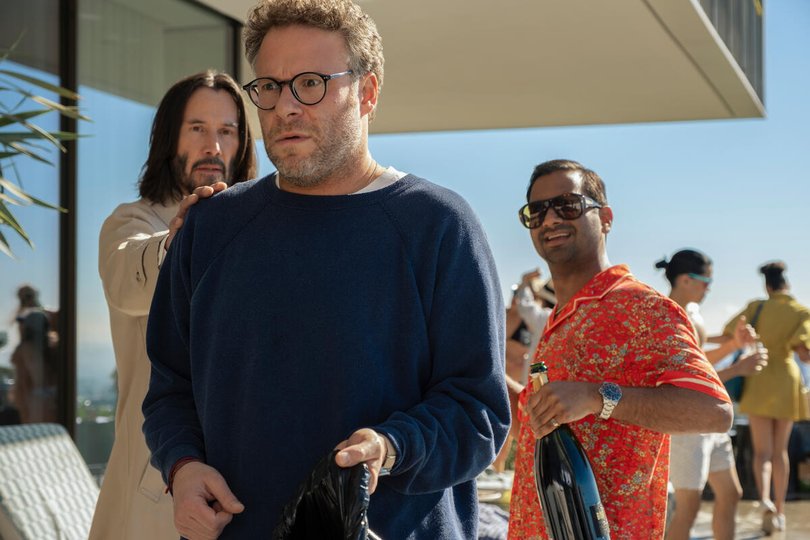
With a conceit that’s a cross between Trading Places, It’s a Wonderful Life and Wings of Desire, Gabriel swaps Arj and Jeff’s lives, and is surprised to discover that money can solve most of your problems.
Good Fortune is an affable film with wry laughs, buoyed by a winsome Reeves, who has always been undeniably charming in any comedic role, and is very much the heart here with his delightful discovery of chicken nuggets, chocolate milkshakes, tacos and dancing.
“Whether it’s Bill and Ted or Parenthood, he’s really funny playing these characters that are kind of a little dumb, but very sweet and naïve,” Ansari said of casting Reeves.
Ansari wrote and directed Good Fortune, his official feature directorial debut after his previous project, Being Mortal, collapsed three weeks into filming when allegations of “inappropriate behaviour” was made against star Bill Murray by a member of the production crew.
Known for his role as Tom Haverford on Parks and Recreation and as a stand-up comedian, Ansari stepped behind the camera for the beloved 2015 Netflix series Master of None, winning in the process, an Emmy for writing for a comedy with creative partner Alan Yang, who is also a producer here.
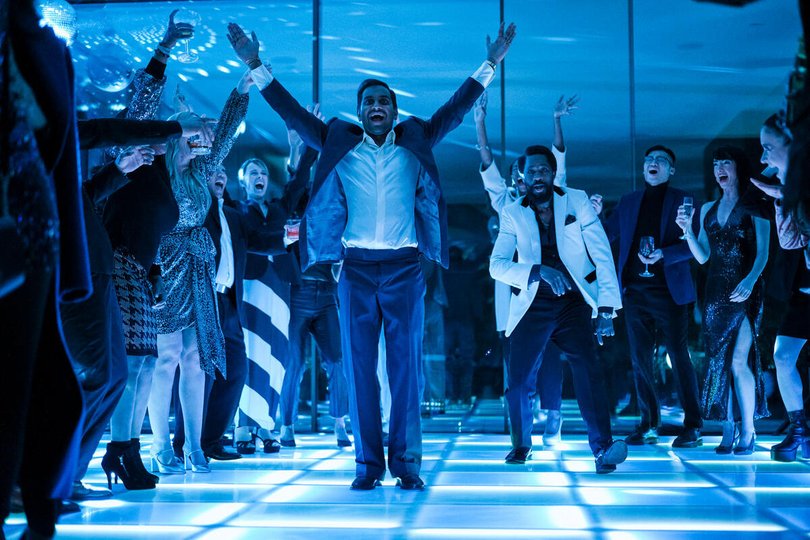
But a sticky 2018 MeToo-adjacent controversy in which he was accused by an unnamed woman of sexual misconduct (she said she felt pressured into sex while on a date, he said he believed everything to be consensual) saw his career momentum dented.
The Ansari case is a particularly contested incident in the MeToo movement in that it was considered, variously, as a thorny situation which facilitated wider conversations about ingrained unequal dating dynamics but also as an overreach and piece of irresponsible reporting which trivialised graver sexual misconduct. It depended on who you asked.
For his part, Ansari embarked on a stand-up tour in 2019, including dates in Sydney and Melbourne, and later released on Netflix, during which he addressed the incident. He seemed chastened and thoughtful, and had a more grounded energy than his earlier comedy sets.
You can draw a line between that experience and Good Fortune. While it is genuinely laugh-out-loud funny, it is also earnest, and one driven by an empathy for some of the most vulnerable workers in a capitalist economy, that of the gig worker.
As much as Ansari will tell you that Good Fortune is about entertaining viewers, the film clearly courses with a generous spirit that is outward looking.
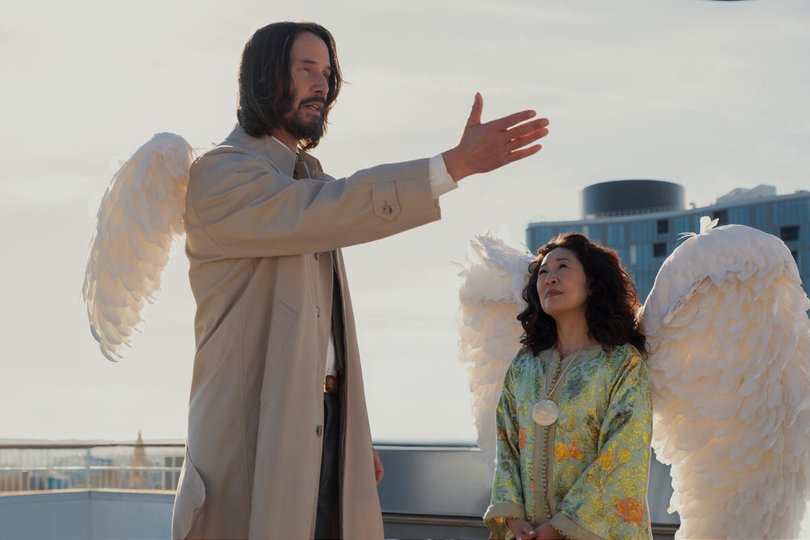
Arj does everything he can to survive – food deliveries, Airtasker-esque random jobs, casual shifts at big box stores and the rest – and while he’s out there hustling, he still can’t make enough money to check into a motel for the night.
There’s a starkness to the actual fact that whether you’re swimming in riches or sleeping out of your car, it has little to do with your work ethic or willingness to pull up your sleeves. Contrast that with Rogen’s character, Jeff, who spends his day jumping between the sauna and the cold plunge, punctuated by the occasional zoom call.
Ansari shadowed actual gig workers on their deliveries and talked to even more, and it made him think about these systems differently.
“It’s not specific about the gig economy because there’s wealth inequality all over the world, and the idea of haves-and-have-nots is pretty universal,” he told The Nightly. “If you watch an old movie like Umberto D, which is made in (the fifties), it’s the same stuff. It’s all relatable.
“It makes you think a little bit more about who all these people are, and what do you do about this?
“I don’t think the movie is there to provide solutions as much as it shows you what is going on.”
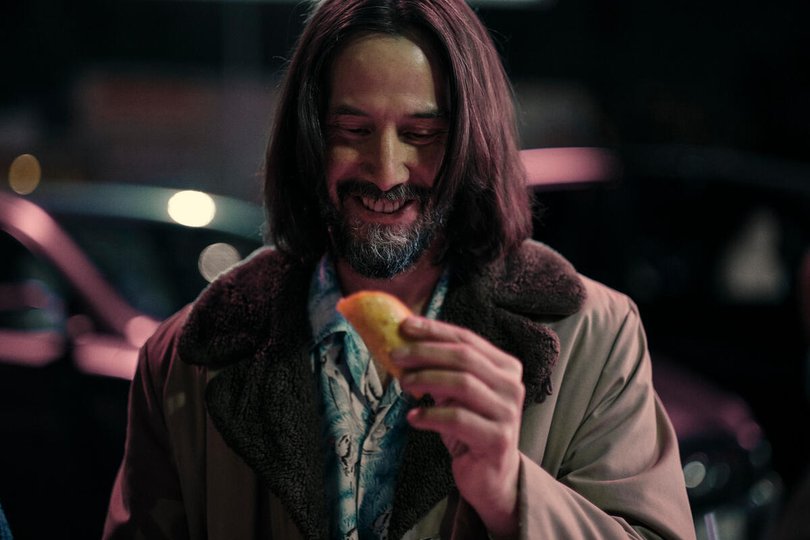
Ansari doesn’t expect to change the audience’s day-to-day behaviour, but at least for him personally, he is tipping harder than he used to. “I mean, I always took care of them, I was never a miser with the tips, (but now) you think about giving people cash instead of using the apps.
“The apps are a little shady sometimes, and if you give people cash, they’re getting it and it’s more useful to get it right away.”
The clip from the film that’s pulled out for marketing, and is in the trailer, is Reeves’ Gabriel reporting back to his problem that swapping Arj and Jeff’s lives really did seem to solve most of Arj’s problems. It’s a funny line, but there is truth to it too.
“A lot of these people that are struggling, that character, they don’t need millions of dollars,” Ansari said. “A hundred bucks, 500 bucks, a thousand bucks, that could make a giant difference for people that are on the edge, that are living pay cheque to pay cheque.
“A lot of the people I interviewed, things would happen where everything would be fine and then (something would happen). The number one cause of bankruptcy in America, I mean in Australia, you guys have proper healthcare, but it’s medical emergencies and things like that.
“Or they get into a car accident and they don’t have car insurance. Little catastrophes can end up being a giant problem for people. So, even a little bit of money could help them. They don’t have enough to cover for an emergency.”
Ansari admitted that wealth inequality is a gargantuan problem that you can’t solve with a simple, ready-to-action list. “It’s systemic, it’s government, it’s how the machine works, and there’s no quick fix to it. Unfortunately, it’s a big, big issue.”
Movies aren’t the solution. They don’t resolve wealth inequality, but maybe Good Fortune can, at the very least, encourage people to tip better.
“If that happened, that would be nice,” he said. “I don’t think you can make a movie to try and change people’s behaviour. If people talk and think, that’s great, but I’m really there to make a movie that people enjoy and laugh and have a good time at the theatre more than anything.
“The conversation afterwards, that’s all gravy.”
Good Fortune is in cinemas on October 30.

